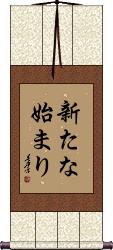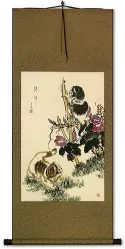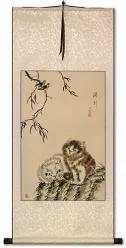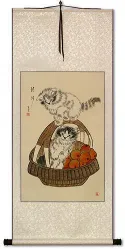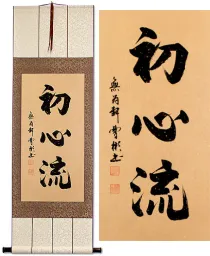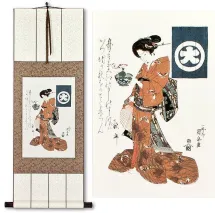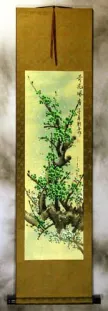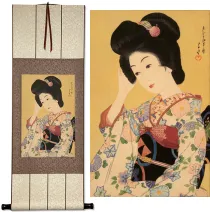Many custom options...
And formats...

Fresh Start in Chinese / Japanese...
Buy a Fresh Start calligraphy wall scroll here!
Personalize your custom “Fresh Start” project by clicking the button next to your favorite “Fresh Start” title below...
Fresh Start
New Beginning
新たな始まり is a Japanese word that means “new beginning” or “new start.”
Here's the character breakdown:
新た (arata) = new; fresh; novel; newly; freshly; or this can be like the prefix “re-” like “re-start” or “reset.”
な (na) is kind of a connecting article. This glues “new” to “beginning.”
始まり (hajimari) = origin; beginning.
Note: Because this selection contains some special Japanese Hiragana characters, it should be written by a Japanese calligrapher.
New Beginning
新しい始め is a verbose Japanese phrase that means “new beginning.”
The first three characters mean new, novel, fresh, recent, latest, up-to-date, or modern.
The last two characters mean beginning, start outset, opening, or origin.
Note: Because this selection contains some special Japanese Hiragana characters, it should be written by a Japanese calligrapher.
This in-stock artwork might be what you are looking for, and ships right away...
Gallery Price: $60.00
Your Price: $36.88
Gallery Price: $90.00
Your Price: $49.88
Gallery Price: $72.00
Your Price: $39.88
Gallery Price: $108.00
Your Price: $59.88
Not the results for Fresh Start that you were looking for?
Below are some entries from our dictionary that may match your Fresh Start search...
| Characters If shown, 2nd row is Simp. Chinese |
Pronunciation Romanization |
Simple Dictionary Definition |
新生活 see styles |
shinseikatsu / shinsekatsu しんせいかつ |
More info & calligraphy: New Life |
リセット see styles |
risetto リセット |
More info & calligraphy: Lissette |
重新做人 see styles |
chóng xīn zuò rén chong2 xin1 zuo4 ren2 ch`ung hsin tso jen chung hsin tso jen |
More info & calligraphy: Fresh Start |
再出発 see styles |
saishuppatsu さいしゅっぱつ |
(n,vs,vi) restart; fresh start |
再発足 see styles |
saihossoku さいほっそく |
(noun/participle) restart; fresh start |
出直し see styles |
denaoshi でなおし |
(n,vs,vi) (1) starting from scratch; making a fresh start; redoing; (n,vs,vi) (2) calling again; visiting again |
出直す see styles |
denaosu でなおす |
(v5s,vi) to come again; to call again; to make a fresh start |
出なおす see styles |
denaosu でなおす |
(v5s,vi) to come again; to call again; to make a fresh start |
別開生面 别开生面 see styles |
bié kāi shēng miàn bie2 kai1 sheng1 mian4 pieh k`ai sheng mien pieh kai sheng mien |
to start something new or original (idiom); to break a new path; to break fresh ground |
心機一転 see styles |
shinkiitten / shinkitten しんきいってん |
(noun/participle) (yoji) changing one's attitude; turning over a new leaf; getting a fresh start |
心気一転 see styles |
shinkiitten / shinkitten しんきいってん |
(irregular kanji usage) (noun/participle) (yoji) changing one's attitude; turning over a new leaf; getting a fresh start |
殻を破る see styles |
karaoyaburu からをやぶる |
(exp,v5r) (idiom) to break up and start anew; to break out of one's shell; to make a fresh start; to go outside oneself |
仕切り直し see styles |
shikirinaoshi しきりなおし |
(1) {sumo} getting poised again for charging; toeing the mark again; (2) starting again; getting a fresh start; going back to square one |
生まれ変わる see styles |
umarekawaru うまれかわる |
(Godan verb with "ru" ending) to be born again; to make a fresh start in life |
振り出しに戻る see styles |
furidashinimodoru ふりだしにもどる |
(exp,v5r) (See 振り出し・2) to go back to square one; to make a fresh start; to be back where one started |
Variations: |
denaosu でなおす |
(v5s,vi) (1) to make a fresh start; to turn over a new leaf; (v5s,vi) (2) to call again; to visit again; to come again |
Variations: |
shinkiitten / shinkitten しんきいってん |
(n,vs,vi) (yoji) changing one's attitude; turning over a new leaf; getting a fresh start |
Variations: |
umarekawaru うまれかわる |
(v5r,vi) to be born again; to make a fresh start in life |
Variations: |
shikirinaoshi しきりなおし |
(1) {sumo} getting poised again for charging; toeing the mark again; (2) starting again; getting a fresh start; going back to square one |
Variations: |
shikirinaoshi しきりなおし |
(1) {sumo} getting poised again for charging; toeing the mark again; (2) starting again; getting a fresh start; going back to square one |
Variations: |
karaoyaburu からをやぶる |
(exp,v5r) (idiom) to break up and start anew; to break out of one's shell; to make a fresh start; to go outside oneself |
The following table may be helpful for those studying Chinese or Japanese...
| Title | Characters | Romaji (Romanized Japanese) | Various forms of Romanized Chinese | |
| Fresh Start | 重新做人 | chóng xīn zuò rén chong2 xin1 zuo4 ren2 chong xin zuo ren chongxinzuoren | ch`ung hsin tso jen chunghsintsojen chung hsin tso jen |
|
| New Beginning | 新たな始まり | arata na hajimari aratanahajimari | ||
| New Beginning | 新しい始め | atarashii hajime atarashiihajime atarashi hajime | ||
Successful Chinese Character and Japanese Kanji calligraphy searches within the last few hours...

